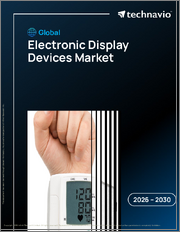
|
시장보고서
상품코드
1636077
교실용 디스플레이 시장 : 유형별, 용도별, 지역별(2025-2033년)Classroom Displays Market by Type (Education Projectors, Interactive Flat Panels, Interactive Tables, Interactive Whiteboards, Wireless Slates, and Others), Application (School, Training Institutions, and Others), and Region 2025-2033 |
||||||
교실용 디스플레이 시장 세계 시장 규모는 2024년 1,033억 달러에 달했습니다. 향후 IMARC Group은 2033년까지 5,420억 달러에 달할 것으로 예상하며, 2025-2033년 연평균 성장률(CAGR)은 19.22%를 나타낼 것으로 전망하고 있습니다. 교육 산업의 번영, 교육용 프로젝터에 대한 수요 증가, 학교에서의 인터랙티브 테이블 채택 확대가 시장을 주도하는 주요 요인으로 꼽힙니다.
교실용 디스플레이는 교사가 격려적이고 창의적인 교실 환경을 조성하는 데 사용됩니다. 교실용 디스플레이는 능동적 학습을 촉진하는 동시에 교사의 디스플레이 기술 기술을 개발할 수 있습니다. 또한 해부학 모형, 숫자 직선, 알파벳 문자 등 다양한 교육 방법에 도움이 될 수 있습니다. 아이들이 만든 장식적, 개념적, 양방향 게시판으로 구성되어 학생들이 서로 협력하도록 유도하여 학생들의 학습 능력과 개인적 능력을 최대한 발휘할 수 있도록 돕습니다. 학생들의 창의력을 개발하여 시각적 학습과 양방향 수업을 촉진합니다. 지속적으로 정보를 업데이트하여 학생들이 브레인스토밍 활동에 집중할 수 있도록 합니다. 또한 학생들이 창의적인 아이디어를 제공하고 창의적인 전시를 자극하여 일상, 책임, 작업, 규칙, 지침, 라벨, 지침 목록 등 학급 관리에 적용 할 수 있습니다.
교실용 디스플레이 시장 동향 :
현재 초중등 교육 현장에서는 학생들에게 특정 주제나 개념을 가르치기 위한 교실용 디스플레이에 대한 수요가 증가하고 있으며, 이는 시장 성장의 중요한 요인 중 하나입니다. 이와 더불어, 자막 지원, 학교 네트워크 연결 기능 등 향상된 기능을 갖춘 교육용 프로젝터에 대한 수요가 전 세계적으로 증가하고 있습니다. 이는 교실에서 인터랙티브 평면 패널과 인터랙티브 테이블에 대한 수요 증가와 함께 좋은 시장 전망을 제공합니다. 또한, 여러 입력 소스를 동시에 표시하고, 스타일러스나 손가락으로 화면상의 컨텐츠를 조작하고, 주석이 달린 컨텐츠를 저장하고 불러올 수 있는 등 다양한 장점으로 인해 인터랙티브 평면 패널에 대한 수요가 증가하고 있습니다. 이는 급성장하는 교육 산업과 맞물려 시장 성장에 기여하고 있습니다. 또한, 주요 기업들은 학생들이 손 등을 사용하여 화면의 컨텐츠와 상호 작용할 수 있는 인터랙티브 테이블을 도입하여 보다 인터랙티브하고 매력적인 학습 경험을 제공합니다. 또한, 교실용 디스플레이의 장점에 대한 대중의 인식이 높아짐에 따라 시장 성장에 박차를 가하고 있습니다. 또한, 전 세계 교육 기관에서 제공하는 이러닝 과정의 수가 증가하고 있는 것도 시장에 긍정적인 영향을 미치고 있습니다.
본 보고서에서 다룬 주요 질문
- 세계 교실용 디스플레이 시장은 지금까지 어떻게 성장해왔고, 앞으로 어떻게 변화할 것인가?
- 세계 교실용 디스플레이 시장 성장 촉진요인, 억제요인 및 기회는 무엇인가?
- 주요 지역 시장은?
- 교실용 디스플레이 시장에서 가장 매력적인 국가는 어디일까?
- 유형별 시장 분석은?
- 용도별 시장 현황은?
- 세계 교실용 디스플레이 시장 경쟁 구도는?
- 세계 교실용 디스플레이 시장의 주요 기업은?
목차
제1장 서문
제2장 조사 범위와 조사 방법
- 조사 목적
- 이해관계자
- 데이터 소스
- 1차 정보
- 2차 정보
- 시장 추정
- 보텀업 접근
- 톱다운 접근
- 조사 방법
제3장 주요 요약
제4장 서론
- 개요
- 주요 업계 동향
제5장 세계의 교실용 디스플레이 시장
- 시장 개요
- 시장 실적
- COVID-19의 영향
- 시장 예측
제6장 시장 분석 : 유형별
- 교육용 프로젝터
- 시장 동향
- 시장 예측
- 인터랙티브 플랫 패널
- 시장 동향
- 시장 예측
- 인터랙티브 테이블
- 시장 동향
- 시장 예측
- 인터랙티브 화이트 보드
- 시장 동향
- 시장 예측
- 무선 슬레이트
- 시장 동향
- 시장 예측
- 기타
- 시장 동향
- 시장 예측
제7장 시장 분석 : 용도별
- 학교
- 시장 동향
- 시장 예측
- 연수기관
- 시장 동향
- 시장 예측
- 기타
- 시장 동향
- 시장 예측
제8장 시장 분석 : 지역별
- 북미
- 미국
- 캐나다
- 아시아태평양
- 중국
- 일본
- 인도
- 한국
- 호주
- 인도네시아
- 기타
- 유럽
- 독일
- 프랑스
- 영국
- 이탈리아
- 스페인
- 러시아
- 기타
- 라틴아메리카
- 브라질
- 멕시코
- 기타
- 중동 및 아프리카
제9장 성장 촉진요인 및 억제요인과 기회
- 개요
- 성장 촉진요인
- 성장 억제요인
- 기회
제10장 밸류체인 분석
제11장 Porter의 Five Forces 분석
- 개요
- 바이어의 교섭력
- 공급 기업의 교섭력
- 경쟁 정도
- 신규 진출업체의 위협
- 대체품의 위협
제12장 가격 분석
제13장 경쟁 구도
- 시장 구조
- 주요 기업
- 주요 기업 개요
- Acer Incorporated
- BenQ Corporation(Qisda Corporation)
- Hitachi Ltd.
- LG Electronics Inc.(LG Corporation)
- Promethean World Ltd.
- Seiko Epson Corporation
- Smart Technologies(Hon Hai Precision Industry Co. Ltd.)
- Sony Group Corporation
The global classroom displays market size reached USD 103.3 Billion in 2024. Looking forward, IMARC Group expects the market to reach USD 542.0 Billion by 2033, exhibiting a growth rate (CAGR) of 19.22% during 2025-2033. The thriving education industry, rising demand for education projectors, and the growing adoption of interactive tables in schools represent some of the key factors driving the market.
Classroom displays are used by teachers to create an encouraging and creative classroom environment. They develop the skills of teachers in display techniques while helping them to promote active learning. They also aid in various teaching methods, such as anatomical models, number lines, and letters of the alphabet. They comprise child created, decorative, conceptual and interactive bulletin boards and used to maximize the learning and personal skills of students by inspiring them to work together. They promote visual learning and interactive lessons by developing their creativity. They keep students engaged in brainstorming activities by continuously updating the information. They also assist students in contributing creative ideas and stimulating creative displays and consequently find applications in class management, such as lists of routines, responsibilities, tasks, rules, directions, labels, and instructions.
Classroom Displays Market Trends:
At present, the increasing demand for classroom displays in elementary and secondary education settings to help teach students about specific topics or concepts represents one of the key factors supporting the growth of the market. Besides this, there is a rise in the demand for education projectors with enhanced features, such as closed captioning support and the ability to connect to school networks, across the globe. This, along with the growing demand for interactive flat panels and interactive tables in classrooms, is offering a favorable market outlook. In addition, there is an increase in the demand for interactive flat panels due to various benefits, such as the ability to display multiple input sources simultaneously, interact with the content on the screen using a stylus or finger, and save and recall annotated content. This, coupled with the burgeoning education industry, is contributing to the growth of the market. Moreover, key players are introducing interactive tables that allow students to interact with the content on the screen using their hands or other objects to offer a more interactive and engaging learning experience. Additionally, the rising awareness among the masses about the benefits of classroom displays is propelling the growth of the market. Furthermore, the growing number of e-learning courses offered by educational institutions worldwide is positively influencing the market.
Key Market Segmentation:
Type Insights:
- Education Projectors
- Interactive Flat Panels
- Interactive Tables
- Interactive Whiteboards
- Wireless Slates
- Others
Application Insights:
- School
- Training Institutions
- Others
Regional Insights:
- North America
- United States
- Canada
- Asia Pacific
- China
- Japan
- India
- South Korea
- Australia
- Indonesia
- Others
- Europe
- Germany
- France
- United Kingdom
- Italy
- Spain
- Russia
- Others
- Latin America
- Brazil
- Mexico
- Others
- Middle East and Africa
- The report has also provided a comprehensive analysis of all the major regional markets that include North America (the United States and Canada), Asia Pacific (China, Japan, India, South Korea, Australia, Indonesia, and others), Europe (Germany, France, the United Kingdom, Italy, Spain, Russia, and others), Latin America (Brazil, Mexico, and others), and the Middle East and Africa. According to the report, North America was the largest market for classroom displays. Some of factors driving the North America classroom displays market are the growing investments by educational institutions in adopting digital learning, increasing adoption of technology-based education, rising emphasis on critical thinking skills among students, etc.
- Competitive Landscape
- The report has also provided a comprehensive analysis of the competitive landscape in the global classroom displays market. Detailed profiles of all major companies have also been provided. Some of the companies include Acer Incorporated, BenQ Corporation (Qisda Corporation), Hitachi Ltd., LG Electronics Inc. (LG Corporation), Promethean World Ltd., Seiko Epson Corporation, Smart Technologies (Hon Hai Precision Industry Co. Ltd.), Sony Group Corporation, etc. Kindly note that this only represents a partial list of companies, and the complete list has been provided in the report.
Key Questions Answered in This Report:
- How has the global classroom displays market performed so far and how will it perform in the coming years?
- What are the drivers, restraints, and opportunities in the global classroom displays market?
- What are the key regional markets?
- Which countries represent the most attractive classroom displays markets?
- What is the breakup of the market based on the type?
- What is the breakup of the market based on the application?
- What is the competitive structure of the global classroom displays market?
- Who are the key players/companies in the global classroom displays market?
Table of Contents
1 Preface
2 Scope and Methodology
- 2.1 Objectives of the Study
- 2.2 Stakeholders
- 2.3 Data Sources
- 2.3.1 Primary Sources
- 2.3.2 Secondary Sources
- 2.4 Market Estimation
- 2.4.1 Bottom-Up Approach
- 2.4.2 Top-Down Approach
- 2.5 Forecasting Methodology
3 Executive Summary
4 Introduction
- 4.1 Overview
- 4.2 Key Industry Trends
5 Global Classroom Displays Market
- 5.1 Market Overview
- 5.2 Market Performance
- 5.3 Impact of COVID-19
- 5.4 Market Forecast
6 Market Breakup by Type
- 6.1 Education Projectors
- 6.1.1 Market Trends
- 6.1.2 Market Forecast
- 6.2 Interactive Flat Panels
- 6.2.1 Market Trends
- 6.2.2 Market Forecast
- 6.3 Interactive Tables
- 6.3.1 Market Trends
- 6.3.2 Market Forecast
- 6.4 Interactive Whiteboards
- 6.4.1 Market Trends
- 6.4.2 Market Forecast
- 6.5 Wireless Slates
- 6.5.1 Market Trends
- 6.5.2 Market Forecast
- 6.6 Others
- 6.6.1 Market Trends
- 6.6.2 Market Forecast
7 Market Breakup by Applications
- 7.1 School
- 7.1.1 Market Trends
- 7.1.2 Market Forecast
- 7.2 Training Institutions
- 7.2.1 Market Trends
- 7.2.2 Market Forecast
- 7.3 Others
- 7.3.1 Market Trends
- 7.3.2 Market Forecast
8 Market Breakup by Region
- 8.1 North America
- 8.1.1 United States
- 8.1.1.1 Market Trends
- 8.1.1.2 Market Forecast
- 8.1.2 Canada
- 8.1.2.1 Market Trends
- 8.1.2.2 Market Forecast
- 8.1.1 United States
- 8.2 Asia-Pacific
- 8.2.1 China
- 8.2.1.1 Market Trends
- 8.2.1.2 Market Forecast
- 8.2.2 Japan
- 8.2.2.1 Market Trends
- 8.2.2.2 Market Forecast
- 8.2.3 India
- 8.2.3.1 Market Trends
- 8.2.3.2 Market Forecast
- 8.2.4 South Korea
- 8.2.4.1 Market Trends
- 8.2.4.2 Market Forecast
- 8.2.5 Australia
- 8.2.5.1 Market Trends
- 8.2.5.2 Market Forecast
- 8.2.6 Indonesia
- 8.2.6.1 Market Trends
- 8.2.6.2 Market Forecast
- 8.2.7 Others
- 8.2.7.1 Market Trends
- 8.2.7.2 Market Forecast
- 8.2.1 China
- 8.3 Europe
- 8.3.1 Germany
- 8.3.1.1 Market Trends
- 8.3.1.2 Market Forecast
- 8.3.2 France
- 8.3.2.1 Market Trends
- 8.3.2.2 Market Forecast
- 8.3.3 United Kingdom
- 8.3.3.1 Market Trends
- 8.3.3.2 Market Forecast
- 8.3.4 Italy
- 8.3.4.1 Market Trends
- 8.3.4.2 Market Forecast
- 8.3.5 Spain
- 8.3.5.1 Market Trends
- 8.3.5.2 Market Forecast
- 8.3.6 Russia
- 8.3.6.1 Market Trends
- 8.3.6.2 Market Forecast
- 8.3.7 Others
- 8.3.7.1 Market Trends
- 8.3.7.2 Market Forecast
- 8.3.1 Germany
- 8.4 Latin America
- 8.4.1 Brazil
- 8.4.1.1 Market Trends
- 8.4.1.2 Market Forecast
- 8.4.2 Mexico
- 8.4.2.1 Market Trends
- 8.4.2.2 Market Forecast
- 8.4.3 Others
- 8.4.3.1 Market Trends
- 8.4.3.2 Market Forecast
- 8.4.1 Brazil
- 8.5 Middle East and Africa
- 8.5.1 Market Trends
- 8.5.2 Market Breakup by Country
- 8.5.3 Market Forecast
9 Drivers, Restraints, and Opportunities
- 9.1 Overview
- 9.2 Drivers
- 9.3 Restraints
- 9.4 Opportunities
10 Value Chain Analysis
11 Porters Five Forces Analysis
- 11.1 Overview
- 11.2 Bargaining Power of Buyers
- 11.3 Bargaining Power of Suppliers
- 11.4 Degree of Competition
- 11.5 Threat of New Entrants
- 11.6 Threat of Substitutes
12 Price Analysis
13 Competitive Landscape
- 13.1 Market Structure
- 13.2 Key Players
- 13.3 Profiles of Key Players
- 13.3.1 Acer Incorporated
- 13.3.1.1 Company Overview
- 13.3.1.2 Product Portfolio
- 13.3.1.3 Financials
- 13.3.1.4 SWOT Analysis
- 13.3.2 BenQ Corporation (Qisda Corporation)
- 13.3.2.1 Company Overview
- 13.3.2.2 Product Portfolio
- 13.3.3 Hitachi Ltd.
- 13.3.3.1 Company Overview
- 13.3.3.2 Product Portfolio
- 13.3.3.3 Financials
- 13.3.3.4 SWOT Analysis
- 13.3.4 LG Electronics Inc. (LG Corporation)
- 13.3.4.1 Company Overview
- 13.3.4.2 Product Portfolio
- 13.3.4.3 Financials
- 13.3.4.4 SWOT Analysis
- 13.3.5 Promethean World Ltd.
- 13.3.5.1 Company Overview
- 13.3.5.2 Product Portfolio
- 13.3.6 Seiko Epson Corporation
- 13.3.6.1 Company Overview
- 13.3.6.2 Product Portfolio
- 13.3.6.3 Financials
- 13.3.6.4 SWOT Analysis
- 13.3.7 Smart Technologies (Hon Hai Precision Industry Co. Ltd.)
- 13.3.7.1 Company Overview
- 13.3.7.2 Product Portfolio
- 13.3.7.3 SWOT Analysis
- 13.3.8 Sony Group Corporation
- 13.3.8.1 Company Overview
- 13.3.8.2 Product Portfolio
- 13.3.8.3 Financials
- 13.3.8.4 SWOT Analysis
- 13.3.1 Acer Incorporated
Kindly note that this only represents a partial list of companies, and the complete list has been provided in the report.



















